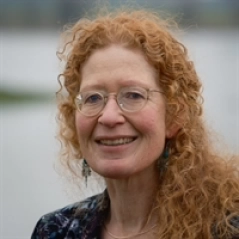
News
The open science story of Annemarie Wagemakers
Annemarie Wagemakers is Personal Professor of Participatory Community Health Promotion at the Group Health and Society. In her research, she actively engages citizens to develop knowledge of their situation and to bring about social change. She shares her experiences and views on citizen science in this Open Science story.
Can you tell us more about your scientific approach?

In most research projects, I use participatory action research. In participatory action research, issues that are relevant to the actors involved are simultaneously studied and addressed. Actors include citizens, professionals, policymakers, or specific groups, like pregnant women or citizens in disadvantaged positions.
In participatory action research, actors can be involved in several research activities, like identifying problems that need to be addressed, formulating research questions, and collecting, analysing, and interpreting data. When lay people or non-professionals are actively engaged in conducting research activities, this is called citizen science.
This research method differs from classical research approaches. In classical research approaches, practice is studied and the idea is that scientists, scientific methods, and results should not be influenced by what happens in practice. In participatory action research, practice is studied with the aim of realising social change. To do so, findings are reported to and discussed with involved actors.
There are several benefits to actors participating in research activities. Data is generated that includes actors’ perspectives and that provides new insights. As a result, better-informed programmes or policies can be built (in co-creation).
Participatory action research does justice to all actors involved, allowing each voice to be heard and respecting everyone’s values, knowledge, and expertise.
Benefits for actors are, for example, increased knowledge of the topic and scientific methods, bigger social networks, and increased community capacity.
How do you keep citizens involved?

Keeping citizens involved is challenging, as citizens do not spontaneously participate in activities, and they need to recognise the need for change. It helps to have personal contacts with citizens, for example through other citizens, experts by experience or professionals who work with citizens. It might also help to ensure citizens that they benefit from participating in research activities. For example, that it is fun to participate, that they can learn something, or that they are rewarded for their input.
An easy way to engage citizens is to ask them what they need to participate in research or what their perceptions are on a specific topic. For example, ask them a question like ‘What does being healthy mean to you?’ Next, a researcher can explore what is most important to citizens about being healthy and what specific actions might follow. It is important to include citizens not only in the first phase of a project when needs are often being assessed, but also in the later phases when a program or policy is being developed, implemented and evaluated.
Do you have an example of results that could not have been achieved without citizen involvement?
In a research project in Slotermeer (Amsterdam), we trained citizen scientists to interview their neighbours about health. In total, 35 citizen scientists were trained, and they interviewed 316 people in the neighbourhood. The citizen scientists were very creative in approaching other citizens in the neighbourhood. For example, some citizen scientists interviewed their friends and family, others interviewed random people at schools, shops, community centres, or on the street. The citizen scientists also helped other citizens, for example, to improve their indoor environmental quality by contacting the housing corporation.
Citizen scientists were very positive about the study as it is ‘a topic worth working on’ and with the information they collected they could ‘do something good for the people’.
What about the quality of the data lay-interviewers collect?
There is an ongoing debate about the lack of quality or the alleged lack of quality in the data citizens collect. On the other hand, lay interviewers or citizen scientists get easier access to more and more diverse groups of citizens compared to researchers, who might have different socio-cultural backgrounds. Having peer interviewers might result in more citizens willing to share their perceptions, and provide more in-depth information, as they feel more at ease talking with citizens than they do with scientists. In the example of Amsterdam, citizen scientists were trained to conduct interviews. This was helpful for the research and citizens appreciated the training.
What can WUR do better when it comes to citizen science?
WUR already does a couple of things very well. There are several successful citizen science projects and there’s also a MOOC on Transformative Citizen Science for Sustainability.
At WUR, a Citizen Science Hub has been established. Everybody is welcome to join this active community. Projects about citizen science can be placed on the website and we hope more citizens will use the website to ask questions and to participate in projects. The hub aims to explore the current situation and gaps regarding
citizen science, and the skills needed for citizen science, as well as to develop indicators for citizen science and to support dialogue with citizens and citizen initiatives. We also organize informal meetings for people interested in citizen science. This community of practice requires constant support and coordination, which WUR can support.
In citizen science, many questions still need to be addressed, for example how to develop guidelines to support actors in deciding when to use citizen science and for what purposes. Another important question is the impact of citizen science. So, I’d welcome more research on how and when to apply citizen science and the impact of citizen science.
What’s your view on open science?
It's obvious that research results should be widely available to everyone because we are also paid by public funds. In addition, journals and research funders often ask you to make your data openly available. However, I do not deposit qualitative data as these cannot be anonymized easily and without context, they cannot be easily used by other researchers.
The WUR data stewards are wonderful! They support me and my colleagues with filling in data management plans. They also support PhD students in submitting data to databases like DANS.
Open science can also benefit citizen science as it offers opportunities for citizens and researchers to connect and exchange knowledge and expertise.
What are your tips for other researchers?
Working with actors and citizens in research activities requires several skills in addition to the knowledge and expertise that a researcher is expected to already have. These extra skills also called soft skills, include for example respect for others’ knowledge, sharing power, communication, conflict management and self-reflection.
In addition, think about both ethical and non-ethical questions that go with citizen science and citizen participation. For example, is there capacity and infrastructure to support citizens, is training needed, which citizens participate (representation), expectation management, who is accountable for what, and will citizens also become co-authors on publications?
This open Science Story is based on an interview with Annemarie Wagemakers by Chantal Hukkelhoven en Annemieke Sweere from WUR Library.